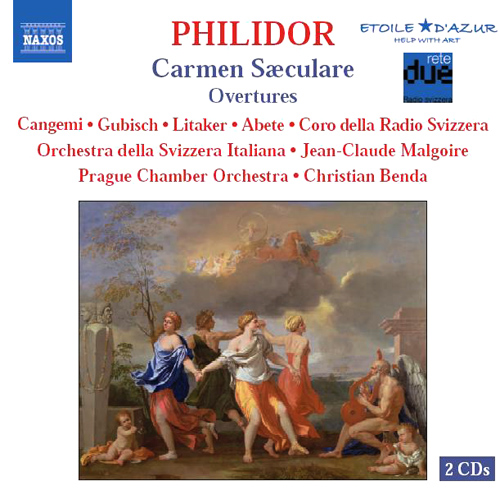PHILIDOR, F-A.D.: Carmen saeculare / Overtures
François-André Danican Philidor pursued successful parallel careers as the composer of over 21 operas and as a chess virtuoso, known not least for his skill in simultaneous blindfold games. His oratorio, Carmen sæculare, is a setting of poems by Horace associated with the Roman centennial celebrations of 17 B.C. Written at the instigation of the Italian scholar Giuseppe Baretti, who chose the Latin texts and sought ‘a man able to temper alternately the solemnity of church-music with the brilliancy of the theatrical’, this majestic, and at times operatic work is coupled with overtures to three of Philidor’s popular and brilliant comic operas.
Tracklist
Prague Chamber Orchestra (Orchestra)
Prague Chamber Orchestra (Orchestra)
Benda, Christian (Conductor)
Prague Chamber Orchestra (Orchestra)
Litaker, Donald (tenor)
Radio Svizzera Choir, Lugano (Choir)
Abete, Antonio (bass)
Cangemi, Veronica (soprano)
Gubisch, Nora (mezzo-soprano)
Litaker, Donald (tenor)
Litaker, Donald (tenor)
Radio Svizzera Italiana Orchestra (Orchestra)
Litaker, Donald (tenor)
Litaker, Donald (tenor)
Radio Svizzera Italiana Orchestra (Orchestra)
Radio Svizzera Choir, Lugano (Choir)
Radio Svizzera Italiana Orchestra (Orchestra)
Radio Svizzera Italiana Orchestra (Orchestra)
Abete, Antonio (bass)
Radio Svizzera Italiana Orchestra (Orchestra)
Radio Svizzera Italiana Orchestra (Orchestra)
Gubisch, Nora (mezzo-soprano)
Radio Svizzera Italiana Orchestra (Orchestra)
Radio Svizzera Italiana Orchestra (Orchestra)
Litaker, Donald (tenor)
Radio Svizzera Italiana Orchestra (Orchestra)
Cangemi, Veronica (soprano)
Gubisch, Nora (mezzo-soprano)
Litaker, Donald (tenor)
Gubisch, Nora (mezzo-soprano)
Radio Svizzera Choir, Lugano (Choir)
Cangemi, Veronica (soprano)
Abete, Antonio (bass)
Radio Svizzera Italiana Orchestra (Orchestra)
Cangemi, Veronica (soprano)
Radio Svizzera Choir, Lugano (Choir)
Radio Svizzera Italiana Orchestra (Orchestra)
Cangemi, Veronica (soprano)
Gubisch, Nora (mezzo-soprano)
Radio Svizzera Italiana Orchestra (Orchestra)
Cangemi, Veronica (soprano)
Gubisch, Nora (mezzo-soprano)
Litaker, Donald (tenor)
Radio Svizzera Italiana Orchestra (Orchestra)
Radio Svizzera Italiana Orchestra (Orchestra)
Radio Svizzera Italiana Orchestra (Orchestra)
Radio Svizzera Choir, Lugano (Choir)
Radio Svizzera Italiana Orchestra (Orchestra)
Litaker, Donald (tenor)
Radio Svizzera Italiana Orchestra (Orchestra)
Gubisch, Nora (mezzo-soprano)
Litaker, Donald (tenor)
Abete, Antonio (bass)
Cangemi, Veronica (soprano)
Gubisch, Nora (mezzo-soprano)
Radio Svizzera Italiana Orchestra (Orchestra)
Cangemi, Veronica (soprano)
Gubisch, Nora (mezzo-soprano)
Litaker, Donald (tenor)
Prague Chamber Orchestra (Orchestra)
Prague Chamber Orchestra (Orchestra)
Poinsinet, Antoine Alexandre Henri - Lyricist
Prague Chamber Orchestra (Orchestra)
Prague Chamber Orchestra (Orchestra)
In 1918, when Austria changed from the Austrian-Hungarian empire to the Austrian Republic, the “Court Opera” became the Vienna State Opera, with the musicians in the orchestra and the singers in the chorus members of Austrian public services. Beside their official duties, the members of the orchestra constitute a private society, the Vienna Philharmonic Orchestra, founded in 1842 by members of the orchestra of the “Court Opera”, to provide an outstanding concert orchestra for Vienna.
The Vienna Philharmonic consists only of musicians who were members of the orchestra of the Vienna State Opera, but not each member of this orchestra is necessarily a member of the Vienna Philharmonic. Membership of the world-famous Vienna Philharmonic Orchestra demands the special agreement of all colleagues. In 1927 the chorus of the Vienna State Opera founded a private choral society called the Konzertvereinigung Wiener Staatsopernchor to provide an outstanding concert choir in addition to the singers’ duties in the opera house.
The orchestra and the chorus of the Vienna State Opera take part in every rehearsal and performance of the Vienna State Opera during the season from 1 September to 30 June. For all performances apart from their official duties, concerts in Vienna, on tour or special appearances, for example at the Salzburg Festival or for studio recordings, they use their private names, the Wiener Philharmoniker (Vienna Philharmonic) and Konzertvereinigung WienerStaatsopernchor (Concert Union of the Vienna State Opera Chorus).
The Bühnenorchester der Österreichischen Bundestheater (Stage Orchestra of the Austrian Federal Theatres) was founded after the war to carry out special tasks on stage at the Vienna State Opera, Vienna Volksoper and the Burgtheater. They are not members of the normal orchestras. In 1999, when the Austrian Federal Theatres were reorganised, the Stage Orchestra of the Austrian Federal Theatres was affiliated to the Vienna State Opera, thus becoming the Stage Orchestra of the Vienna State Opera.

Born in New Orleans, Louis Gottschalk was the son of a father born in London, raised in Germany and of Spanish Jewish ancestry, and of a Creole mother. He studied in Paris and made an early reputation with his piano pieces, redolent of New Orleans. He won considerable fame as a pianist in Europe, though had less success on his return to America in 1853. He divided the following years between Central and South America and the United States, until compelled by a possible scandal to abandon the last of these. He died in Brazil in 1869.
Piano Music
A pianist himself, with a punishing schedule of concert tours, Gottschalk wrote a great deal of music for the piano, much of it influenced by his native New Orleans.
Orchestral Music
Gottschalk wrote two symphonies and a quantity of marches and dances.































